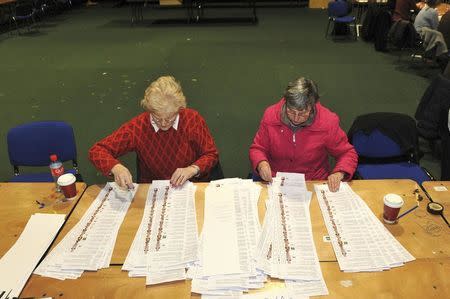Irish instability looms as rival parties doubt coalition prospects
By William James and Padraic Halpin
DUBLIN (Reuters) - Ireland's political stalemate following an inconclusive national election deepened on Sunday after senior figures in the two biggest parties expressed opposition to forming together what looks like the only viable coalition government.
With vote counting still underway after Friday's poll, the heavy losses suffered by Prime Minister Enda Kenny's Fine Gael continued to mount. However, its old rival, Fianna Fail, has so far outperformed forecasts, making an unprecedented coalition between the two centre-right parties the most obvious option.
But their mutual enmity, dating back nearly a century to the Irish civil war, persists, prompting some to speculate that the only way to break the deadlock might be a second election that would put financial markets on edge.
"I wouldn't favour a government with Fine Gael," Fianna Fail's enterprise spokesman Dara Calleary told national broadcaster RTE late on Saturday.
"Any programme for government would have to be put before our members and I certainly can tell you the Fianna Fail people here (in my constituency) are overwhelmingly against any coalition."
Senior members of Fine Gael, which won 25.5 percent of first preference votes and is set to remain the biggest party, though with far fewer seats than predicted, were equally reluctant.
Health Minister Leo Varadkar, widely seen as the strongest contender to eventually succeed Kenny, said a grand coalition was not something he favoured, while Finance Minister Michael Noonan raised the prospect of a second election "very shortly".
"I just don't think it's going to happen, I don't think Fianna Fail will go in as a minority party with Fine Gael," Fine Gael PM Eoghan Murphy told Reuters.
Two other Fianna Fail frontbench members opposed a coalition with Fine Gael. One warned it would boost the left-wing Sinn Fein, the former political wing of the Irish Republican Army (IRA), by turning it into the main official opposition.
"GRAVE INSTABILITY"
Leaders of both parties insisted they needed to wait until the vote counting ends on Monday before considering their options and many on both sides conceded a solution was unlikely to be found by the time parliament resumes on March 10.
That would echo recent elections in Portugal and especially Spain, whose ruling centre-right party failed to win re-election in a December poll. The country remains without a government.
"There will be grave instability (in Ireland) for the next month when people are talking to each other," said Eoin O'Malley, senior lecturer at Dublin City University.
"It's highly unlikely that a majority coalition government will be formed, more likely a minority government leading to an election sometime later this year, if not an immediate election."
The divide between the two main parties dates back to a rift between Irish revolutionary heroes Michael Collins and Eamon de Valera at the end of Ireland's 1919-21 war of independence over whether to accept a compromise agreement with the British.
But both sides are also surveying a transformed political landscape for pitfalls that could threaten their own survival.
"Up until now, they peddled this line that there's so much that separates them when the dogs on the streets know that there's actually very little between them," said David Farrell, a politics professor at University College Dublin.
"In the event that they were to form a grand coalition, you really are going down the road towards likely merger and that is why you are going to find elements completely against it."
Sinn Fein's final seat count is likely to fall short of the party's high hopes, winning just over a handful of extra seats and further emboldening Fianna Fail, which is set to more than double its share to have twice Sinn Fein's representation.
Analysts believe that Ireland's economy can handle a degree of uncertainty, having grown around 7 percent last year.
However, while Irish bond yields remain near record lows, the spread between them and French yields last week hit their widest in eight months due to jitters over the election and concerns over the impact on Irish trade of Britain's possible exit from the European Union after a planned June referendum.
"There will be weakness in Irish bond prices on Monday morning. Markets don't like uncertainty but we don't anticipate a big knee-jerk reaction because investors were ready for this outcome," said Ryan McGrath, a bond dealer at Cantor Fitzgerald.
"The longer it goes on, the more nervous investors would become. If you had the duel challenges of political instability coupled with a looming 'Brexit' (after Britain's In-Out EU referendum), the Irish bond market would find it very challenging."
(Editing by Gareth Jones)




